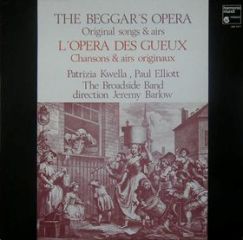John Gay - The Beggar's Opera - Original Songs & Airs (1992)
John Gay - The Beggar's Opera - Original Songs & Airs (1992)

1. Cold and raw
a) Stingo, or the Oil of Barley (Playford Dancing Master)
b) The Farmer's Daughter (T.d'Urfey's Pills)
c) Version ''The Beggar's Opera''
d) Up in the Morning Early (W.McGibbons)
2. Over the hills and far away play
a) Jockey's Lamentation (Pills to Purge Melancholy)
b) Version ''The Beggar's Opera''
c) Over the Hills and Far Away (Ms. Américain c.1780)
d) The wind has blown my plaid away (Ms.Drexel)
3. Oh, the broom
a) The Broom o' the Cowdenknowes (Chanson écossaise)
b) Broom, Broom, The bonny, bonny Broom (Playford)
c) Version ''The Beggar's Opera''
4. Would you have a young virgin
a) Poor Robin's Magot (The Dancing Master, 1713)
b) Would you have a young virgin (Air populaire, 18ème siècle)
c) Kare Broder (C.M.Bellman)
d) Version ''The Beggar's Opera''
e) Saw ye a Lassie of fifteen years (J.Oswald's Comp.)
5. What shall I do to show how much I love her
a) Version ''The Beggar's Opera''
b) What shall I do (Henry Purcell)
6. Fill ev'ry glass play
a) Bergers, écoutez la musique (Noel Français)
b) Version ''The Beggar's Opera''
7. Charming Billy
a) Charming Billy (Air populaire, 18ème siècle)
b) Cease your funning (Variations pour flute, J.Oswald's Comp.)
8. The lass of Patie's mill
a) The Lass of Patie's Mill (W.Thompson's Orpheus Caledonius)
b) Variations sur la melodie de J.Oswald
c) Version ''The Beggar's Opera''
9. Greensleeves
a) Variations sur Passomezzo antico
b) Greensleeves (version la plus ancienne)
c) Version contemporaine W.Cobbold)
d) Version ''The Beggar's Opera''
e) Version irlandaises
The Broadside Band, dir. Jeremy Barlow
Patrizia Kwella, soprano
Paul Elliott, tenor
The Beggar's Opera is a ballad opera in three acts written in 1728 by John Gay. It is one of the watershed plays in Augustan drama and is the only example of the once thriving genre of satirical ballad opera to remain popular today. Ballad operas were satiric musical plays that used some of the conventions of opera, but without recitative. The lyrics of the airs in the piece are set to popular broadsheet ballads, opera arias, church hymns and folk tunes of the time.
The Beggar's Opera premiered at the Lincoln’s Inn Fields Theatre on 29 January 1728 and ran for 62 consecutive performances, the longest run in theatre history up to that time. The work became Gay's greatest success and has been played ever since. The original production was so successful that John Rich, the manager of the theatre, was able to build a new theatre, the Theatre Royal, Covent Garden, forerunner of the Royal Opera House. In 1920, The Beggar's Opera began an astonishing revival run of 1,463 performances at the Lyric Theatre in Hammersmith, London, which was one of the longest runs in history for any piece of musical theatre at that time.
The piece satirised Italian opera, which had become popular in London. According to The New York Times: "Gay wrote the work more as an anti-opera than an opera, one of its attractions to its 18th-century London public being its lampooning of the Italian opera style and the English public's fascination with it." Instead of the grand music and themes of opera, the work uses familiar tunes and characters that were ordinary people. Some of the songs were by opera composers like Handel, but only the most popular of these were used. The audience could hum along with the music and identify with the characters. The story satirised politics, poverty and injustice, focusing on the theme of corruption at all levels of society. Lavinia Fenton, the first Polly Peachum, became an overnight success. Her pictures were in great demand, verses were written to her and books published about her. After appearing in several comedies, and then in numerous repetitions of The Beggars Opera, she ran away with her married lover, Charles Paulet, 3rd Duke of Bolton.
download: uploaded anonfiles yandex 4shared solidfiles mediafire mega filecloudio
Zmieniony (Wtorek, 19 Listopad 2013 12:50)








